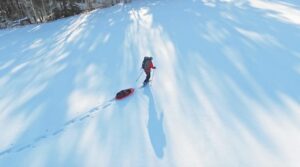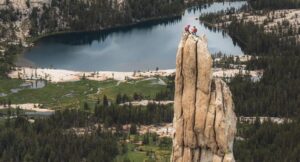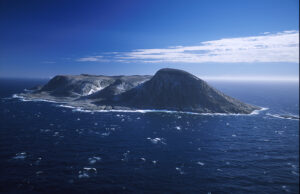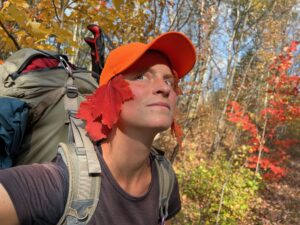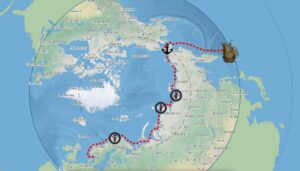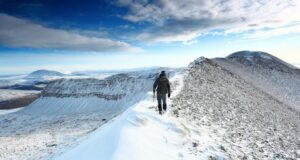When Justin Barbour “struck ice” in 2018, it would have been easy to sit back and rue his luck. It was one of the earliest winters in 25 years in Labrador, and Barbour was not kitted out for the freeze. Instead, Barbour viewed it as an opportunity.
In late June, the Newfoundland teacher will return to the Canadian Far North to begin a 3,800km odyssey from Hudson Bay down to Cape Pine, the southernmost point on the island of Newfoundland. It’s a completely new route and significantly more ambitious than his 2018 paddle across Labrador and northern Quebec. He estimates that it will take 12 months and involve canoeing, snowshoeing, backpacking, and packrafting.

Barbour’s route, beginning in the Inuit village of Puvirnituq. Photo: Justin Barbour
All four seasons
“I want to experience a full year in the northern wilderness. To experience the four seasons as the indigenous people of the area have. I felt good physically and mentally in 2018. I had enough summer experience, but my winter skills in the subarctic cold weren’t there yet. With one mistake, you could freeze to death. I knew I had to get ready.”

With lots of upriver travel, Barbour will have to portage often. Photo: Justin Barbour
Barbour returned to work as a teacher but assigned himself winter skills homework during his time off. He invested in traditional Inuit and Innu winter gear, a four-meter toboggan, wooden snowshoes, moccasins, a canvas tent, and a wood stove. Each winter, he tested out his new gear in Labrador, slowly developing an affinity for the extreme cold.
The first section of Barbour’s journey will split roughly 50-50 between upriver and downriver travel. He needs to cover around 700km from Hudson Bay to the village of Tasiujaq and has budgeted up to 40 days to get there. It’s the stage of the trip he’s most looking forward to.
“I haven’t spent much time on the tundra and love the wide open landscape,” he says. “The country stretches on forever, with not a human in sight. It really makes you feel small.”

The northern lights during a previous expedition in Quebec. Photo: Justin Barbour
Hunting for two
Barbour plans to take around 35 days of food for this first stage. “I can get by on a pound of food per day if I need to,” he explained. Barbour plans to augment his rations by hunting, fishing, and resupplying at the various Inuit communities along the way. “There should be plentiful fish and I can hunt rabbits and grouse at various points in the expedition too.”
Barbour will be hunting and fishing for two, at least at the start of the trip. As in 2018, his dog Saku will join him. “He’s a summer dog, so my wife will collect him once I reach Churchill Falls and winter sets in.”

Barbour and Saku. Photo: Justin Barbour
The expedition will be continuous, but winter will require at least a short stop to unload the dog and collect his winter gear, and wait out the worst of the early winter, when travel is difficult, in his tent.
“Conditions can change quickly, as I discovered in 2018,” he says. “Hopefully winter holds off till November…I’ll [then] wait until conditions are better. It could be two weeks, it could be a month.”
The winter break will come after stage two of his journey, almost 700km of brutal upriver travel to either Churchill Falls or at worst, Schefferville. It will be quite a slog, but Barbour doesn’t reckon it’ll be as tough as the next section of his journey. “Upriver from Tasiujaq will be hard, but anything in a canoe is easier than pulling a toboggan in snowshoes. For roughly 1,100km from the Trans-Labrador Highway down, I’ll be manhauling, with the potential for storms and deep snow.”

Saku in Newfoundland’s Great Northern Peninsula. Photo: Justin Barbour
Canoeing to Newfoundland
In late spring, he’ll transition to backpacking and packrafting as he makes his way down Newfoundland. But just getting to Newfoundland won’t be easy. Barbour will need to cross an 18km stretch of water in April or May of next year. His crossing will depend on the pack ice in the strait and he will take local advice about the best time to go.
We will update Barbour’s expedition as it progresses.

